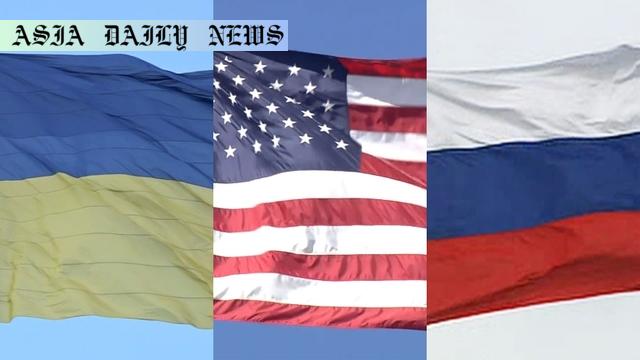Crimea: US proposes peace plan including annexation recognition and blocking Ukraine’s NATO bid as peace negotiations intensify.
US proposes peace plan, recognizing Russia’s annexation of Crimea.
Plan excludes Ukraine’s entry into NATO as part of the deal.
Easter ceasefire sees violations from both Russia and Ukraine.

US Proposes Controversial Peace Plan Involving Crimea
The United States has reportedly put forward a peace proposal to Ukraine that includes the controversial recognition of Russia’s annexation of Crimea. According to the Wall Street Journal (WSJ), the plan also bars Ukraine from joining NATO. This high-stakes diplomatic maneuver signals a significant shift in US policy, potentially aimed at ending the ongoing conflict between Russia and Ukraine.
While this proposal underscores America’s efforts to mediate peace, it has drawn criticism due to its implications for Ukraine’s sovereignty and security. The annexation of Crimea by Russia in 2014 has been deemed illegal under international law. By suggesting recognition of this annexation, the US risks retaliatory backlash from its allies and further undermines international norms. This development could significantly influence the fragile balance of peace in Eastern Europe and beyond.
Ceasefire Violations Persist Despite Diplomatic Efforts
Meanwhile, both Russia and Ukraine have accused each other of violating the Easter ceasefire declared by Russian President Vladimir Putin—a 30-hour truce meant to ease tensions temporarily. Russia’s defense ministry has reported over 4,900 violations from Ukraine, including the alleged use of drones. On the other hand, Ukrainian President Volodymyr Zelenskyy claimed 2,935 violations from the Russian side.
The ceasefire was intended to set a precedent for negotiation and reconciliation, but the violations underscore the deep mistrust and ongoing hostilities between the two nations. Civilians have continued to face hardship, with vital infrastructure damaged during missile and drone attacks. Zelenskyy has urged Russia to extend the ceasefire and halt attacks on civilian infrastructure for at least 30 days, a plea that remains unaddressed.
Peace Efforts Hinge on Complex Diplomatic Conversations
The US proposal is a pivotal move in ongoing peace negotiations, but its success depends on myriad factors, including the willingness of Russia and Ukraine to compromise. For Ukraine, recognizing Crimea as Russian territory is a controversial step that risks losing public support, while exclusion from NATO may leave the country vulnerable to future aggression. For Russia, any concessions in other contested areas could be seen as a loss of political dominance.
Tensions between the two nations have far-reaching consequences for global stability. The international community remains divided, with some nations supporting Ukrainian sovereignty and others advocating for Russian dominance in Crimea. If the proposed agreement fails to align with the broader interests of key stakeholders, it risks perpetuating conflict rather than resolving it.
Strategic Implications for Global Politics
If the US plan is implemented, it could alter the geopolitical landscape significantly. Recognition of Crimea’s annexation by the US might encourage other nations to adopt similar stances, further legitimizing Russia’s claims. Conversely, denying Ukraine entry into NATO might deter ongoing provocations but simultaneously weaken the military alliance’s influence in the region.
The deal also serves as a litmus test for diplomatic strategies in resolving conflicts of territorial disputes worldwide. The West’s approach to Crimea could set a precedent for how other international conflicts—such as those in Taiwan or the South China Sea—are addressed in the future. The outcome of these negotiations will undoubtedly influence global geopolitical strategies for years to come.
Commentary
The Balance Between Realpolitik and Idealism
The US proposal to recognize Russia’s annexation of Crimea as part of a broader peace plan for Ukraine demonstrates a pragmatic but contentious approach to global politics. While it aims to bring an end to years of conflict, the offer raises questions about its alignment with democratic values and international law. The annexation of Crimea by Russia in 2014 violated Ukraine’s sovereignty and the principles of territorial integrity upheld by the UN. By suggesting recognition of this annexation, the US risks undermining its leadership on global norms and providing a dangerous precedent for authoritarian regimes worldwide.
Long-Term Risks Versus Short-Term Gains
From a strategic perspective, Washington’s move might be aimed at delivering short-term peace, but the repercussions could last for decades. Ukraine has steadfastly resisted Russia’s aggression, and recognizing Crimea’s annexation might alienate Ukrainian leaders and citizens alike. This could undermine US-Ukraine relations and make future alliances difficult. Furthermore, barring Ukraine from NATO membership might embolden Russia to continue its offensive actions, knowing that NATO would be constrained in its response.
Global Perceptions and International Precedents
The international response to this proposal will likely be mixed. For nations concerned about territorial disputes, such as Georgia or Taiwan, this agreement could be seen as capitulation to aggressors. On the other hand, countries prioritizing economic and political stability may view the plan as a necessary compromise. The repercussions of this deal will resonate far beyond Eastern Europe, shaping perceptions of US leadership and the effectiveness of international law in resolving conflicts.
In conclusion, while the US proposal concerning Crimea reflects an effort to bridge the gap between Russia and Ukraine, its potential to destabilize international norms and undermine global trust cannot be ignored. The global community must tread cautiously, ensuring that any peace agreement bolsters long-term stability and upholds the principles of justice and sovereignty.


